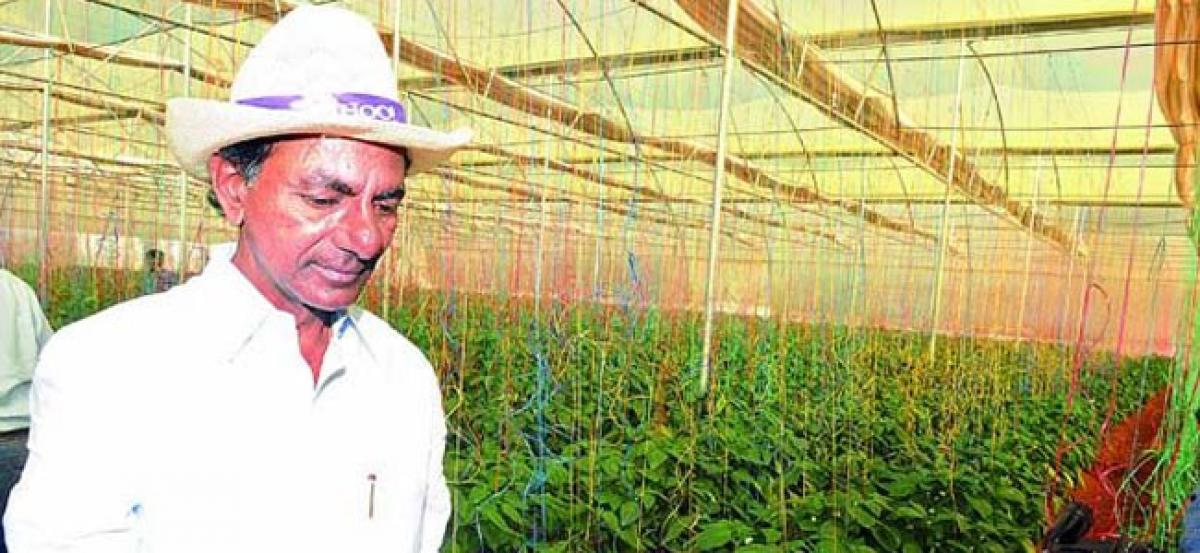Live
- BJP’s ‘Maha’ focus on Telangana
- Revanth govt plans to corner BRS with land report
- Horoscope for November 28: Decoding Cosmic Clues for All Zodiac Signs
- Aishwarya Rai Bachchan’s Sister-in-Law Shrima Rai Shares Cryptic Post After Taking a Dig at Her
- Karnataka: Congress ministers indulge in lobbying ahead of Cabinet reshuffle
- Sujata joins duty after Odisha govt rejects leave extension
- Tur, urad prices have fallen in last 3 months: Govt
- NASA Alert: 130-ft Asteroid 2024 WQ2 Racing Past Earth at Over 62,000 km/h – Should We Be Concerned?
- What is UNSC Resolution 1701 and How it Relates to the Israel-Lebanon Ceasefire
- CM Mohan Majhi reviews preparedness at BJP state office ahead of PM Modi's visit
Just In

The latest announcement of Chief Minister K Chandrashekhar Rao to give Rs 8,000 per acre at the rate of Rs 4,000 for kharif and Rabi seasons to each farmer will go a long way in developing agriculture as a profitable profession. It is for the first time anywhere in the world a government is providing investment to the farmer and organising farmer federations to monitor the sector.
The latest announcement of Chief Minister K Chandrashekhar Rao to give Rs 8,000 per acre at the rate of Rs 4,000 for kharif and Rabi seasons to each farmer will go a long way in developing agriculture as a profitable profession. It is for the first time anywhere in the world a government is providing investment to the farmer and organising farmer federations to monitor the sector.
If a situation comes where the farmer is placed in such a difficult position of not being able to sell his produce, farmers’ federations will step in and buy it by offering the support price. The government has given a guarantee to farmers’ federation and seed fund of Rs 500 crore. CM says they will have adequate funds at their disposal to buy produce from farmer. Modalities for their successful functioning are being worked out. Amid this, the State government has unveiled an Agriculture Action Plan.
The average size of landholding per farmer in the state according to census is 1.12 hectares. The total number of operational holdings is 55.54 lakh, covering an area of 61.97 lakh hectares. Based on climatic factors, Telangana comprises four agro-climatic zones which have been further sub-divided into 98 different farming situations like black, red, shallow, lateritic etc soils. It is estimated that about 57 lakh hectares are under cultivation. Cereals like rice, wheat, jowar; pulses like red gram, green gram, black gram; groundnut, soya been, castor, cotton, chillies, sugarcane, onion etc are the crops that are grown in the state.
Seed is the most important agriculture input and hence seed production and distribution is a continuous process in the state. Quality seed of about ten lakh quintals produced in the state is distributed to the farmers through state and central schemes like national food security mission and normal state plan. There are 10 state seed production farms in the state. Seed village programme and certified seed production through seed villages is an important activity that is being taken up to ensure supply of quality seed to farmer. Eradication of spurious seeds is a continuous process.
Fertiliser is an essential commodity and a critical input in crop production. Plant protection which needs greater attention to prevent yield loss due to incidence of pests and diseases is addressed carefully. Three crop insurance schemes have been in implementation since 2016 kharif season, namely, Pradhan Mantri Fasal Bhima Yojana, Weather-based Crop Insurance Scheme and Unified Package Insurance Scheme. All farmers borrowing crop loans from any bank are compulsorily covered under crop insurance. It is optional for others.
The government is attaching a great importance to agriculture extension to transfer latest agricultural technologies and propagate best practices to farmers. Women too are made to play a critical role in all farm-related activities from land preparation to marketing and contribute a higher proportion of labour. To strengthen women participation Farm Women Empowerment program is being implemented.
Rainfed Area Development (RAD) program with an objective of increasing agricultural productivity of rainfed areas in a sustainable manner is being implemented. It aims at promoting integrated farming system with emphasis on multi-cropping, rotational cropping, inter-cropping, mixed cropping practices with allied activities like horticulture, livestock, fishery etc. for sustaining livelihood.
Soil Health Management, a major technological challenge, is yet another activity that is being taken up to increase soil nutrients and thus enhance crop productivity for ensuring food security and sustaining rural development. Soil testing is being taken up in all farmers’ fields with a view to facilitating balanced fertilisers application and farmers are provided with soil health cards.
The government intends to divide the state into various crop colonies and an assessment is being made to estimate the requirement of various agricultural produce, vegetables, oil products, fruits etc both for domestic and for export purposes. The assessment covers not only the requirements of human beings but also those of livestock.
The government is also toying with an idea to restrict some lands for growing only vegetables to meet the growing demand for them. A village could be made self-sufficient in vegetables if at least two farmers for every village exclusively grow vegetables and supply to the entire village. In other words, every village could have an exclusive vegetable growing crop colony, so goes the thinking in the government.
Should the government succeed in realising plans, it will rid the farmers of exploitation for decades together. The farmer would become a happy and wealthy person in the state of Telangana. (Writer is Chief Public Relations Officer of Telangana Chief Minister)
By Vanam Jwala Narasimha Rao

© 2024 Hyderabad Media House Limited/The Hans India. All rights reserved. Powered by hocalwire.com







